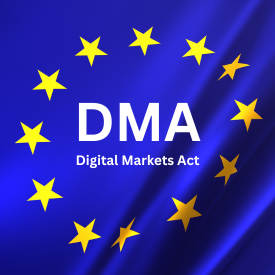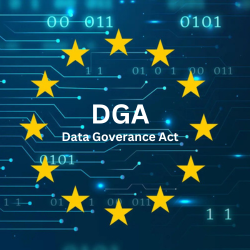Data Privacy Laws in EU

The European Union (EU) is a leader in creating a safer and fairer digital space, with several key regulations designed to ensure privacy, security, competition, and innovation. Let’s explore the key regulations shaping the digital landscape in the EU.
Digital Markets Act (DMA)
The DMA aims to ensure fair competition in the digital economy by regulating “gatekeepers”—large online platforms that control access to digital markets. These platforms include companies like Google, Meta, and Amazon, whose services many businesses and consumers rely on.
Key goals of the DMA are to:
- Prevent anti-competitive practices.
- Promote innovation by opening opportunities for smaller players.
- Empower consumers with more choices.
Covered entities include online search engines, social networks, app stores, and cloud services. Covered data types encompass user-generated data, financial data, and behavioral data.
Key obligations for gatekeepers include:
- Allowing third-party apps to interoperate with their services.
- Providing access to performance data on advertising.
- Enabling users to easily uninstall preinstalled apps.
 Digital Services Act (DSA)
Digital Services Act (DSA)
The DSA complements the DMA but focuses more on the responsibilities of online platforms regarding illegal content and services. It regulates how platforms must moderate content and communicate with users while balancing freedom of speech and safety.
Key provisions of the DSA include:
- Mandatory transparency in algorithms and recommendation systems.
- Stricter rules on illegal content (e.g., hate speech, counterfeit goods).
- Clearer accountability for platforms, particularly those with over 45 million users in the EU.
Data Governance Act (DGA)

The DGA establishes a framework for data sharing across sectors in the EU, encouraging data-driven innovation while ensuring privacy protection.
DGA and GDPR: The DGA complements GDPR by allowing the safe and ethical sharing of data without compromising privacy. It emphasizes transparency, access, and voluntary data sharing, especially for public interest uses.
Data Act
The Data Act focuses on creating a harmonized approach to data access and sharing across industries, providing a legal framework for how businesses and consumers can access and utilize data. It seeks to clarify rights related to industrial data, promoting data innovation and collaboration between industries.
Key goals:
- Ensure data portability.
- Encourage cross-sector data sharing.
- Provide protections for SMEs when dealing with larger enterprises.
European Health Data Space (EHDS)
The EHDS is a proposed framework designed to foster health data sharing across the EU, enhancing research, innovation, and healthcare delivery.
EHDS and GDPR: The EHDS complies with GDPR by ensuring that all health-related data processing adheres to the strict data protection standards set by the regulation. It focuses on protecting sensitive personal health data.
Regulatory body: The European Data Protection Board (EDPB) oversees health data privacy, ensuring compliance with GDPR.
Artificial Intelligence Regulation
The EU’s Artificial Intelligence (AI) Act aims to establish a regulatory framework for AI, with a particular focus on high-risk applications such as healthcare, transport, and law enforcement.
AI Regulation and GDPR: Like GDPR, the AI Regulation centers on privacy protection, especially for automated decision-making and data processing. It requires transparency and accountability when AI is used in high-risk scenarios.
Regulatory body: The European Artificial Intelligence Board (EAIB) is proposed to ensure compliance with AI regulations.
EU Digital Operational Resilience Act (DORA)
DORA ensures that financial entities in the EU are resilient to ICT-related disruptions. It sets uniform requirements for how firms should manage, monitor, and report cyber risks, fostering a stronger digital ecosystem in the financial sector.
Key provisions:
- Firms must have a comprehensive ICT risk management framework.
- Regular testing of digital operational resilience must be conducted.
- Incident reporting is standardized across the EU to improve responses to cyber threats.
NIS 2 Directive
The NIS 2 Directive updates the original NIS Directive, broadening its scope to cover more sectors critical to the economy and society, such as healthcare, energy, and digital infrastructure. It strengthens cybersecurity across the EU, requiring companies to take practical steps to safeguard their networks and data.
Practical Implications:
- Companies in critical sectors must adhere to stricter cybersecurity measures.
- Firms must notify authorities about major cyber incidents within 24 hours.
- Compliance is mandatory, with significant penalties for non-compliance.
Example: A large energy provider must now report any serious data breaches to authorities promptly and ensure its systems are safeguarded against future threats.
Conclusion EU’s data privacy laws and digital regulatory framework are comprehensive and aims to foster a secure, competitive, and fair digital economy. Each of these laws addresses different aspects of digital operations—whether it’s data protection, competition, or resilience—while maintaining a strong emphasis on privacy, especially through close alignment with GDPR. Together, they set a global standard for responsible digital market governance and data privacy.

 Digital Services Act (DSA)
Digital Services Act (DSA)